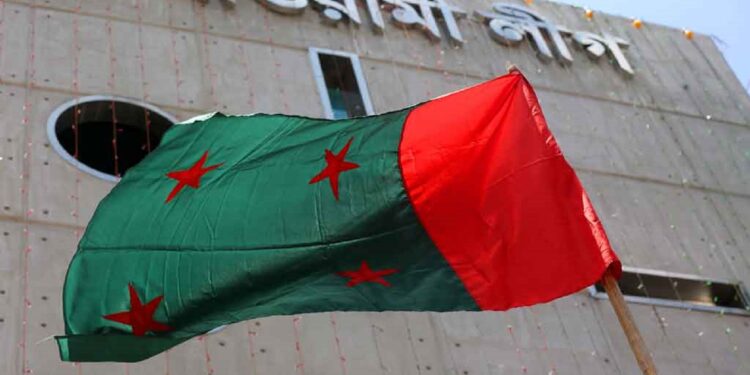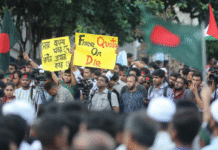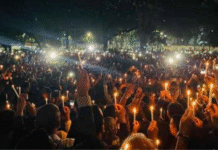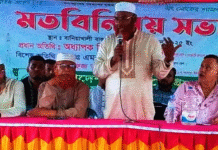Even as questions loom over free, fair and participatory elections in Bangladesh, there is real fear that subversion of the electoral process could spell doom for the country

A file photo. (Photo: Dhaka Tribune)
Clearly, Prime Minister Sheikh Hasina, who has been continually ruling over Bangladesh for the past 14 years with an iron and repressive hand that, more often than not, has had tragic consequences for the people, is not familiar with the much acclaimed book, Haiti, State Against Nation: The Origins and Legacy of Duvalierism by Michel-Rolph Trouillot. At the centre of Bangladesh’s own experience of state against nation is a simple, but at once complicated, question — will the people be able to exercise their sovereign right to vote or will the government of the day take recourse to chicanery and duplicity to undermine the will of the people?
No one in Bangladesh — not even the ruling Awami League oligarchy — has any clear answer to what should be an otherwise normal and routine exercise in any democratic state governed by the principles of rule of law, justice and equity. There is some agreement among Bangladeshis that the 2008 general elections, conducted under the shadow of the much-feared army, was to a large extent free and fair and therefore acceptable to the nation. The Awami League swept the election. But after 2014, Bangladesh was subjected to “interconnected transformations” by an Awami League apparatus that increasingly fell back and relied on power centralisation, graft and terror.
In many ways, the accumulation of more and more power by the ruling Awami League “led to new forms of state intrusion” — and therefore violence — “into the organisation of everyday life”. The consequence of such extreme concentration of unbridled power by the state elites led to “the remaking of the traditional authoritarian state (the martial law regimes of the 1970s and 1980s) into a totalitarian apparatus”.
As Trouillot writes in the context of Haiti under the Duvaliers —Francois and Jean-Claude ‘Baby Doc’ — “the state forced civil society to abide by the political rules it defined” and in a manner in which the “Duvalierist leaders systematically planned such an enduring system of control”. In, so far as Bangladesh is concerned, the cynical silence on the part of regional and global powers served to engender the systematic violence perpetrated by the ruling regime and certainly in “excess of the limits defined by an established constitution” or whatever this much-abused document in Bangladesh means.
A stark example of how far the Bangladeshi state has “gone beyond the culturally specific limits on the use of violence” – a new kind of state violence — by the ruling elites (Bangladesh under the rule of its military strongmen of the past would appear to be a picnic) was the September 14 judicial pronouncement that sentenced two human rights activists who had sought to document instances of “enforced disappearances” between 2014 and beyond.
The duo were able to document only about 65 cases of “enforced disappearances” when the popular belief is that the real number of Bangladeshis who remain untraced — presumed dead — could be in the hundreds, if not thousands. Since 2014, violence in Bangladesh has become total, a “daily sign of the omnipotence of a state that obey(s) no logic beyond its own”. It is this singularly fearsome image of the state that has served to have greater effect than the use of large scale physical violence. What has loomed over Bangladesh in the last nine years is a “climate of terror”.
Over the years, the perverse strength of the ruling Awami League ingeneral and the accumulated power of the chief executive or chief of the state (Sheikh Hasina) in particular, did not stem from the “outright annihilation of the traditional institutions and apparatuses” but in their progressive “taming”, “domestication” and finally subjugation. This task, certainly not easy, has been at the humongous expense of the shattering of all or most of Bangladesh’s fragile institutions, including the military and the clergy. The result has been a “swallowing” of the state by the executive.
It must, however, be admitted that in Bangladesh today the state functions as a consequence of a degree of distribution of power among a small and seemingly “efficient” clique of Awami Leaguers, bureaucrats and co-opted businessmen. As with most South Asian countries, the Bangladeshi state is not delinked from corruption. Indeed, over the last two terms of the Sheikh Hasina regime it has not been so much the “admittedly high degree of administrative corruption…but the total disappearance of (the) ethical veneer”. This is reminiscent of Duvalierist Haiti where “corruption became the very foundation of the administrative machine, its only raison d’etre. One entered the state apparatus only to benefit from it, for there was no pretense about doing anything else. Corruption became politically effective as never before; it guaranteed the unconditional endorsement of the regime’s supporters”, as Trouillot writes. In Bangladesh today, there has been a near-complete collapse of even an “ethical facade”, if there ever was one.
And as Bangladeshis as a nation find themselves at a critical juncture in their quest for democracy — it could be a road to deliverance or plunging into an abyss — the only glimmer of hope that they see is the degree of pressure that the Western powers can exert on the Bangladeshi state to submit to the will of the people and call for a truly free, fair, participatory and inclusive election. But much also depends on the country’s fractured polity and an already sclerotic economy that could collapse over the next one month or so and unleash forces beyond the control ofthe state. There is time yet for the Awami League to pull Bangladesh back from the abyss. But will it?









